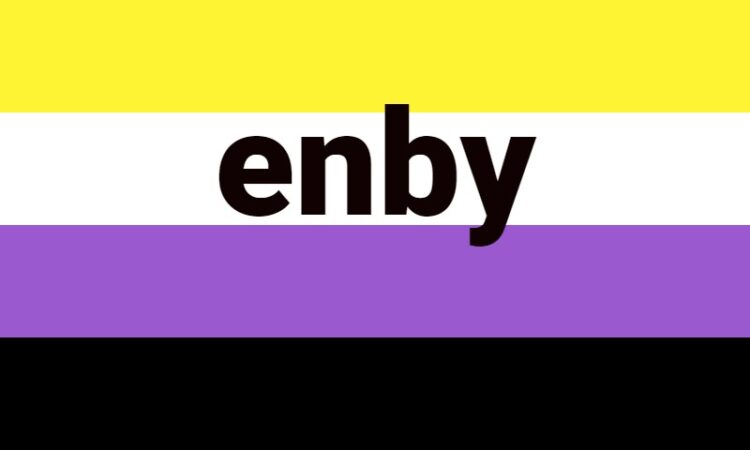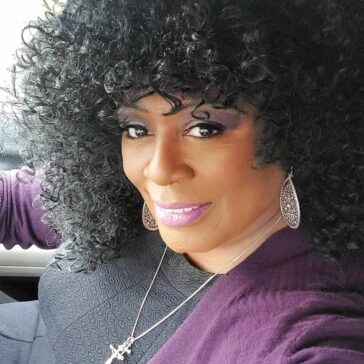‘Enby’ Legal Battle: Who Has the Right to Own an Identity?
Tensions arise as company seeks exlusive rights to non-binary label.

Examining the pitfalls that have stumbled the growth of Wildflower Sex—a New York City-based sexual wellness boutique—is an intriguing study of three triggering years of operation.
It highlights the potentially negative impact of white American residents’ empathetic allyship for mistreated non-white races and gender identities.
Within the past 15 months, the company—under an LLC owned and operated by white, gender non-conforming couple Amy and Nick Boyajian—has reckoned with two separate, well-publicized incidents.
These issues have been related to allegations of their inability to navigate the divides between race and gender that empower, divide, and generally frustrate the country’s current attempts at achieving unity.
Noting where Wildflower made missteps and calling out wrongdoings isn’t enough.
Instead, by identifying overall marketplace flaws potentially at the root of these incidents, it may be possible to learn how capitalism can better serve the sex industry’s need for a thriving independent marketplace.
Does anyone own ‘enby’?

enby is a Black/Trans-owned sexual wellness company based in Portland, Oregon, that opened in September 2020. Operated by three non-binary identifying entrepreneurs, it seeks to become a corporation committed to higher standards of purpose, accountability, and transparency.
A month later on October 27, 2020, enby started a GoFundMe page.
The goal? To afford legally contesting Wildflower Sex’s contention that they had an established commercial and marketing link to their brand name.
Well under 5% of the world’s sexual wellness owner/operator entrepreneurs are Black. Trans, likely even less.
In America, there’s a profound difference in the number of Black AND Trans professionals in the sexual wellness retail business compared to white people. Wildflower Sex, as a business, may have felt correct in their actions.
However, the optics of their desire to have market control in the emerging “enby” marketplace—and doing so by legally infringing upon people of color—has rubbed many people the wrong way. For lack of a better phrase, it’s being interpreted as a bizarre type of “gender-based colonialism.”
Using enby’s logic, the term “enby” is a catch-all phrase empowering the non-binary gender identifying community being used as a celebratory brand name—for a company owned and operated by “enby”-defined Americans.
Instead, Wildflower Sex wanted to block the company from operating as “enby” because it was a name shared by a year-old line of their popular devices.
In particular, these were made to increase sexual awareness and comfort for gender non-conforming people—using the term “enby” as a product name sold by Wildflower as a brand.
Related to this issue, when the “enby” line was released in 2019, Wildflower Sex, under the company named Boyajian Products LLC, applied with the United States Patent and Trademark Office (USPTO) for a trademark on the term “enby.”
Only 22 days later on June 2019, the office denied their application, citing that “enby” was more a narrative, cultural descriptor than a brand name, in writing, “businesses and competitors should be free to use descriptive language when describing their own goods and/or services to the public in advertising and marketing materials.”
Cease and desist
In the week following enby reaching their $25,000 goal regarding Wildflower Sex’s threatened legal action, Wildflower noted that they “wholeheartedly preferred not to engage in any legal course of action with enby via an Instagram story post, and promised to donate to trans women in need.
Yet USPTO’s rejection of the trademark claim has not stopped Wildflower from taking a different legal route. The October cease and desist order sent to Enby that sparked the GoFundMe has not been rescinded.
According to documents provided to Future of Sex from the shop Enby LLC, on Nov. 17, 2020, Boyajian Products LLC filed a lawsuit alleging trademark infringement in the District of Oregon under section 43a of the Lanham Act.
Boyajian Products LLC seeks damages, including payment for legal fees from Enby LLC, and also demands a jury trial.
Questionable behavior

Even though WIldflower Sex does not have an official patent, they still have grounds for a lawsuit, because Wildflower Sex’s “Enby” device existed before the enby brand.
An analogous situation exists in country music. After receiving pressure in the wake of America’s racial unrest, longtime country music act Lady Antebellum changed their name to Lady A, a shorthand version of Lady Antebellum which they had previously trademarked, though not used.
However, another artist, unbeknownst to Lady Antebellum, had a longstanding recording history also using the name Lady A. In a Slate article related to the lawsuit for control of the name Lady A that ensued, trademark attorney Alexandra Roberts notes the following:
“You can’t get a registration based on a plan to use something in the future, or just paying a fee and saying that you want it. You have to show actual use in interstate commerce and you don’t need a registration to get trademark rights.”
Clearly, in relation to Wildflower Sex and enby, enby is in the position of not having engaged in as much interstate commerce as Wildflower Sex. Thus, Wildflower Sex has a precedent, though without a trademark officially, to have greater rights to potential ownership of enby as a name that encompasses both commerce and unfortunately, a human identity.
Moreover, how Wildflower Sex’s suit emerges is alluded to when Roberts notes, “…when you establish some goodwill in your name, and you do that for a few years, you have trademark rights and you don’t ever have to do anything to confirm those trademark rights. And if somebody then infringes, if somebody sets up a shop down the road…and create confusion among consumers, you can sue them.”
There are even deeper corollaries regarding this behavior in the business world. For example, Kimberly-Clark is the sole producer of Kleenex-branded facial tissues because they hold the Kleenex facial tissues trademark. Thus, not all facial tissues can officially be known as “Kleenex” in the marketplace.
By comparison, Wildflower Sex—by being the trademark holder of “enby” would be the only people with whom the term could be officially associated in the marketplace.
However, facial tissue doesn’t enable historically marginalized people a tenuous grasp on sociocultural existence amid reemergent racial strife. Thus, Wildflower Sex’s argument—though potentially based in truth on paper and opinion—does not hold under scrutiny defined with gender visibility as an added perspective.
This would be a significant issue if it were just this case alone. However, this is not the only time Wildflower Sex has run afoul of perceived problems in how it presents itself to minority populations.
Bad vibes, bad press
In 2019, aggravated by the untrue perception that Donald Trump supporter Peter Thiel funded their competitor Unbound, Wildflower Sex publicly protested the company.
Unbound, unfazed, threatened with a lawsuit and Wildflower Sex relented. Instead, they privately spoke to their brand representatives—eight of whom were Black women—regarding their Unbound concerns.
Though made aware of what was later found to be a baseless claim, none of the women ceased their partnership with Unbound. In response, Wildflower Sex unfollowed them on social media, reduced their contact, and told other brands and sponsors that these women were “ethically compromised.”
In response, in a Medium post entitled “Dildon’t Disrespect Black Femmes: Our Personal Experiences With Wild Flower Sex Shop,” Ev’Yan Whitney—one of the eight previously-mentioned ex-brand ambassadors—made a resounding argument regarding the issue regarding white Americans, capitalism, and supporting people of color:
“I view Wild Flower Sex as highly hypocritical for deeming me as being ethically compromised while their co-founder, Nick, continues to work at Google, one of the largest and most unethical companies in the world—something that I don’t know if they’ve been fully transparent with their own community about. It’s puzzling that two people who seem to position themselves as being on the top of the moral high ground can have such cognitive dissonance about their complex and complicated relationship to capitalism.”
Capitalism without colonialism?
The sexual wellness marketplace has the potential of being worth $123 billion by 2026.
That’s a value worth twice as much as the combined current estimated worth of the 50 most expensive sports franchises in the world. It’s also a marketplace where production, consumption, and distribution are not limited to specific areas of the globe.
If only by noticing how both marketing-forward and litigious they are in building their brand, Wildflower Sex is looking to be a commercial winner in the highly competitive sexual wellness start-up industry. Thus, launching even the smallest product is a massive deal for the brand itself. More significantly, its investors, potential buyers, and their collective communities are also impacted.
Intriguingly, one look at Harvard Business Review’s 2006 marketing study “Strategies to Fight Low-Cost Rivals” offers a solution. Ideally, the study serves as a framework to deal with potentially less invasive social and business practices than those described above that benefit a smaller, growing company like enby.
Ideally, it’d be similar to in 2000, how Dow Corning had a 40% share of the global silicones market. Finding the market challenging to dominate at a higher percentage, Dow Corning created Xiameter, a boutique silicone products company.
Compared with Dow Corning, which sells 7,000 products, the subsidiary would sell only 350. Xiameter—with parent Dow Corning’s aid—faces intense competition from low-cost upstarts, as well as parent Dow Corning itself. The strategy proved successful. Dow Corning turned a loss of $28 million in 2001 into profits of $500 million in 2005.
“A two-pronged strategy delivers results only when the low-cost operation is launched offensively to make money—not as a purely defensive ploy to hurt low-cost rivals,” author Nirmalya Kumar’s study notes.
Crowdfunding support
The Portland shop enby has now raised more than $30,000 from 900 people in 30 days via Go Fund Me.
This support for enby’s legal fight along with 8,000-word Medium testimonials alleging Wildblower Sex’s racist and sexist behavior highlights an extraordinary level of anger that could very well impact the New York City company’s financial bottom line.
If looking for an equitable, yet still profitable solution Kumar’s example from Harvard Business Review is an ideal course of action.
enby’s GoFundMe, as much a call to ensure they have legal support as it has spurred an impressive online support campaign via Instagram.
Impressively, numerous ex-Wildflower Sex brand ambassadors are named. We live during both the COVID-19 pandemic and a twin racial and sociocultural emergency in America. Also, 6,000 retail stores have closed. The strife has led to an increase of 50% in social media use.
A situation where potential customers are being warned that a company is aggressively using strategies perceived as sexist, racist, genderist, and when unemployment in America has reached 15% at times—reflecting the grossest tendencies of capitalism isn’t ideal.
Offering solutions to a company with no regulatory demand to amend or redevelop their business practices is merely a hopeful note for an equitable solution. In a year where people—especially marginalized Americans—feel fear and doubt in every aspect of their lives, keeping pleasure pleasurable is an achievable goal that combats frustration, isolation, and a sense of failure that threatens us all.
Image sources: WikiMediaCommons, WikiMediaCommon/Joan Braun, GoFundMe/Shop Enby

















